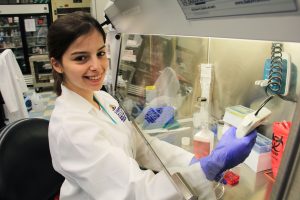
Hypoxia, explains second-year PhD candidate Inês Godet, is counterintuitive. While most cells die if removed from a source of oxygen, some breast cancer cells are so mutated that a lack of oxygen serves to empower them, making them more aggressive and more likely to go on the attack.
Researchers know that hypoxia is related to many of cancer’s functions within the tumor—including the formation of blood vessels and cell invasion—and that hypoxic cancers are more likely to result in treatment failure and in death. But it is not clear what happens to hypoxic cells that metastasize outside the tumor—whether they continue their aggressive behavior as they enter the bloodstream or move to other parts of the body. These are the questions that Godet tackles in her lab on Johns Hopkins’ School of Medicine campus.
“No one knows, in the body, what each cell is doing,” Godet says. “That’s the level I want to go.” The answers to such fundamental questions, she adds, could lead to improvements in treatment practices.
Always interested in oncology research, Godet first came to ChemBE during the final semester of her combined bachelor’s/master’s program in biological engineering at Técnico Lisboa in her native Portugal. When a post-doctoral fellow in Godet’s first lab moved on to start her own lab, Godet, who had been accepted into ChemBE’s doctoral program, joined her. That PI has become a guide not just in her investigations, Godet says, but in her entire professional approach.
“My mentor is the kind of mentor I want to be,” says Godet, who aspires to an academic career teaching and doing research. “She lets us be independent and trusts our judgment. That works as motivation for me: It’s my project and I want to make it better—I’m not following someone else’s recipe, but building my own. But on the other hand, she challenges us to go beyond the obvious. When we discuss results, she questions me: ‘What does this mean? Why is this relevant? Why are you doing this?’ Now that’s my approach too. Everything has to have a meaning.”
In 2016, Godet was one of the first two winners of the prestigious Maria de Lourdes Pintasilgo Award, established by Técnico Lisboa to honor female graduates for their contributions to engineering. It was fitting recognition for Godet, who spent time while at Técnico speaking to young girls about their hopes and plans for the future.
“I realized there is this idea out there that engineering is for the boys,” Godet says. “The girls would tell me they want to build something to save the world, but they would limit themselves to thinking about basic science. I would tell them if they studied engineering, they would have a wider skill set. I felt like I was inspiring those girls to want more.”